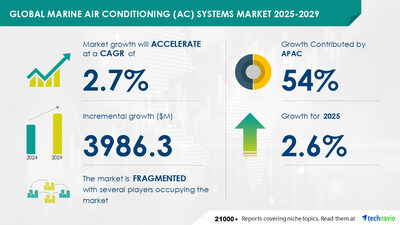Marine Air Conditioning Systems Market to Grow by USD 3.99 Billion (2025-2029), Driven by Commercial Shipping Growth, AI Impact on Trends - Technavio
PR Newswire
NEW YORK, Jan. 20, 2025
NEW YORK, Jan. 20, 2025 /PRNewswire/ -- Report on how AI is redefining market landscape - The global marine air conditioning (AC) systems market size is estimated to grow by USD 3.99 billion from 2025-2029, according to Technavio. The market is estimated to grow at a CAGR of over 2.7% during the forecast period. Growth in commercial shipping is driving market growth, with a trend towards increasing marpol regulations. However, high safety issues and piracy threats associated with digital air conditioning systems poses a challenge. Key market players include Aquamare Marine Ltd., BRONSWERK GROUP Ltd., Carrier Global Corp., Chongqing Acir Marine Co. Ltd., Daikin Industries Ltd., Dometic Group AB, Eberca Holding BV, Flagship Marine Inc., FRIGOMAR Srl, GEA Group AG, Heinen and Hopman, Johnson Controls International Plc, Mabru Power Systems, MARINAIRE TECHNOLOGIES INC., Nissin Refrigeration and Engineering Ltd., Ocean Breeze, Pompanette LLC, The Koja Group, Veco S.p.A, and Webasto SE.
AI-Powered Market Evolution Insights. Our comprehensive market report ready with the latest trends, growth opportunities, and strategic analysis- View Free Sample Report PDF
Forecast period | 2025-2029 |
Base Year | 2024 |
Historic Data | 2019 - 2023 |
Segment Covered | Product (Chiller systems, Self contained systems, and Split systems), End-user (Leisure ships and Commercial ships), and Geography (APAC, Europe, North America, South America, and Middle East and Africa) |
Region Covered | APAC, Europe, North America, South America, and Middle East and Africa |
Key companies profiled | Aquamare Marine Ltd., BRONSWERK GROUP Ltd., Carrier Global Corp., Chongqing Acir Marine Co. Ltd., Daikin Industries Ltd., Dometic Group AB, Eberca Holding BV, Flagship Marine Inc., FRIGOMAR Srl, GEA Group AG, Heinen and Hopman, Johnson Controls International Plc, Mabru Power Systems, MARINAIRE TECHNOLOGIES INC., Nissin Refrigeration and Engineering Ltd., Ocean Breeze, Pompanette LLC, The Koja Group, Veco S.p.A, and Webasto SE |
Key Market Trends Fueling Growth
The Marine Air Conditioning (AC) Systems market is witnessing significant trends in the maritime industry. Strategies to enhance cabin comfort in ships, particularly in the cruise shipping sector, are driving the demand for refrigerant air conditioners and evaporative air conditioners. The shipbuilding industry's urbanization and enhanced globalization are leading to an increase in the number of passenger vessels, cargo vessels, and yachts, boosting the market growth. Heat and humidity management are crucial for maintaining air quality and cabin dryness in ships. Refrigerant gases play a vital role in the refrigeration process. Energy efficiency is a key focus area to mitigate overcapacity issues. The market caters to various segments, including cruise ships, ocean liners, ferries, yachts, and cargo vessels. HVAC systems, heating systems, and cooling systems are essential components of marine AC systems. The leisure industry, maritime tourism, and yachting are significant end-users. Sea water is used for cooling in many marine AC systems. Non-major ports and coastline areas are emerging markets for marine AC systems due to the growing maritime cargo and cruise shipping industries. Temperature control and capacity are critical factors influencing the market. Shipyards are major players in the market, supplying marine AC systems to various clients.
The marine industry faces increasing scrutiny regarding the environmental impact of air conditioning systems on ships and other seaborne vessels. The International Convention for the Prevention of Pollution from Ships (MARPOL) is a significant international regulation addressing marine pollution, particularly from ships. These vessels contribute to air pollution through the emission of nitrogen oxides (NOx), fine particulate matter (PM2.5), and sulfur oxides (SOx). These emissions not only violate air quality standards but also pose threats to marine life and human health near ports and coastlines. To mitigate these issues, the marine air conditioning market is focusing on developing eco-friendly systems that comply with stringent environmental regulations while ensuring optimal cooling performance.
Insights on how AI is driving innovation, efficiency, and market growth- Request Sample!
Market Challenges
- The Marine Air Conditioning (AC) Systems market faces several challenges in the shipping industry. With increasing heat and humidity on board, ensuring cabin comfort is crucial for clients in the leisure industry, including cruise ships, ocean liners, ferries, and yachts. Refrigerant air conditioners and evaporative air conditioners are popular solutions. However, selecting the right refrigerant gas is essential for energy efficiency and environmental sustainability. Shipbuilding industry's urbanization and enhanced globalization lead to overcapacity, necessitating strategies to optimize AC systems' capacity. HVAC systems, including heating and cooling systems, must meet stringent energy efficiency standards. Temperature control, air quality, and cabin dryness are key concerns. Sea water and non-major ports present unique challenges for AC systems. Maritime cargo and cruise shipping require refrigeration systems to maintain temperature. Maritime tourism, yachting, and shipbuilding also depend on AC systems for cabin comfort. Shipyards must address these challenges to meet clients' demands for efficient and effective AC solutions.
- The maritime industry plays a crucial role in globalization by facilitating trade between countries. However, it faces a significant challenge in the form of piracy and armed robbery. These incidents have increased in various regions including Europe, Southeast Asia, East Asia, South Asia, the Persian Gulf, Madagascar, the Canary Islands, North America, and the Caribbean Sea. The root cause of this issue is the lack of effective government policies and the socio-economic conditions in countries like Somalia, where piracy has become an attractive option due to widespread drought and famine. These factors have posed a major threat to the safety and security of ships and their crews, leading to significant financial losses for the shipping industry.
Insights into how AI is reshaping industries and driving growth- Download a Sample Report
Segment Overview
This marine air conditioning (ac) systems market report extensively covers market segmentation by
- Product
- 1.1 Chiller systems
- 1.2 Self contained systems
- 1.3 Split systems
- End-user
- 2.1 Leisure ships
- 2.2 Commercial ships
- Geography
- 3.1 APAC
- 3.2 Europe
- 3.3 North America
- 3.4 South America
- 3.5 Middle East and Africa
1.1 Chiller systems- Marine air conditioning systems, specifically chiller systems, play a crucial role in providing cooling and climate control for the interior spaces of boats, ships, and other maritime vessels. These systems are increasingly popular due to their energy efficiency, which helps vessel operators reduce costs and adhere to sustainability concerns. The marine tourism and leisure industries' expansion has fueled demand for advanced air conditioning systems, including chiller systems, to ensure passenger comfort. Technological advancements and energy efficiency regulations further boost market growth. As the marine industry evolves, the demand for chiller systems is expected to rise, driving the market's expansion during the forecast period.
Download complimentary Sample Report to gain insights into AI's impact on market dynamics, emerging trends, and future opportunities- including forecast (2025-2029) and historic data (2019 - 2023)
Research Analysis
The Marine Air Conditioning (AC) Systems market caters to the cooling and temperature control needs of ships, ensuring comfortable living conditions for crew and optimal preservation of cargo. These systems utilize refrigerant gases to absorb heat from the air, releasing cooled air into the cabin. Sea water is often used as a cooling medium in open-loop systems, while closed-loop systems use refrigerant as the cooling medium. The shipbuilding industry's growth, urbanization, and enhanced globalization drive the demand for marine AC systems. However, overcapacity and energy efficiency concerns pose challenges. Temperature and air quality are crucial factors influencing the market, with the need for systems capable of maintaining optimal conditions for both crew and cargo. Strategies to address these challenges include the development of more energy-efficient systems and the integration of renewable energy sources.
Market Research Overview
The Marine Air Conditioning (AC) Systems market caters to the cooling and heating needs of various marine vessels, including cruise ships, ocean liners, ferries, yachts, and cargo vessels. The process involves the use of refrigerant gases to absorb heat from the air, resulting in cooled cabin comfort. Evaporative air conditioners and refrigerant air conditioners are common types used in the maritime industry. The market is driven by factors such as urbanization, enhanced globalization, and the growing demand for cabin comfort in the leisure industry. The market faces challenges from overcapacity and energy efficiency concerns. The shipbuilding industry, maritime tourism, and yachting are significant clients. HVAC systems, heating systems, and refrigeration systems are integral to the market. Temperature control, air quality, and humidity management are crucial considerations. Shipyards and non-major ports also play a role in the market's growth. The market serves the maritime industry's diverse needs, from cargo vessels to passenger vessels, along the coastline and at major and non-major ports. Sea water is used in some cooling systems, adding complexity to the market.
Table of Contents:
1 Executive Summary
2 Market Landscape
3 Market Sizing
4 Historic Market Size
5 Five Forces Analysis
6 Market Segmentation
- Product
- Chiller Systems
- Self Contained Systems
- Split Systems
- End-user
- Leisure Ships
- Commercial Ships
- Geography
- APAC
- Europe
- North America
- South America
- Middle East And Africa
7 Customer Landscape
8 Geographic Landscape
9 Drivers, Challenges, and Trends
10 Company Landscape
11 Company Analysis
12 Appendix
About Technavio
Technavio is a leading global technology research and advisory company. Their research and analysis focuses on emerging market trends and provides actionable insights to help businesses identify market opportunities and develop effective strategies to optimize their market positions.
With over 500 specialized analysts, Technavio's report library consists of more than 17,000 reports and counting, covering 800 technologies, spanning across 50 countries. Their client base consists of enterprises of all sizes, including more than 100 Fortune 500 companies. This growing client base relies on Technavio's comprehensive coverage, extensive research, and actionable market insights to identify opportunities in existing and potential markets and assess their competitive positions within changing market scenarios.
Contacts
Technavio Research
Jesse Maida
Media & Marketing Executive
US: +1 844 364 1100
UK: +44 203 893 3200
Email: media@technavio.com
Website: www.technavio.com/
![]() View original content to download multimedia:https://www.prnewswire.com/news-releases/marine-air-conditioning-systems-market-to-grow-by-usd-3-99-billion-2025-2029-driven-by-commercial-shipping-growth-ai-impact-on-trends---technavio-302354884.html
View original content to download multimedia:https://www.prnewswire.com/news-releases/marine-air-conditioning-systems-market-to-grow-by-usd-3-99-billion-2025-2029-driven-by-commercial-shipping-growth-ai-impact-on-trends---technavio-302354884.html
SOURCE Technavio



